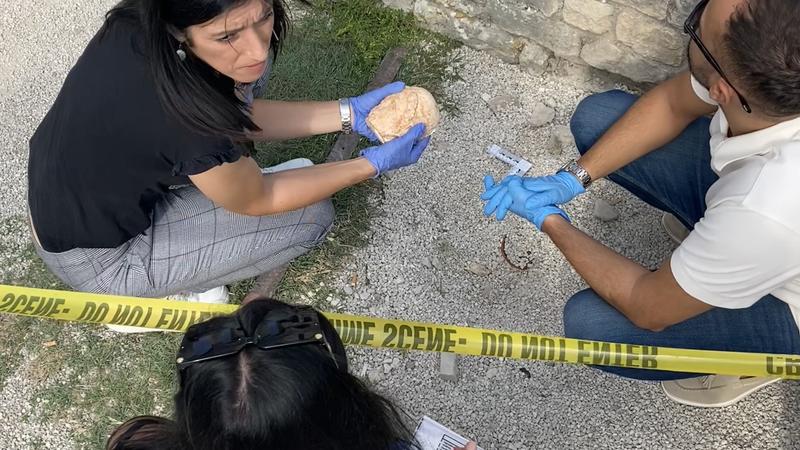Project
Combating illicit cross-border trafficking in cultural property in the OSCE area


Quick links
- Project period:
- 1 October 2021 - 30 September 2026
- Implemented by:
- Transnational Threats Department, OSCE Secretariat
- Fields of work:
- Border management
Overview
The illicit trafficking in cultural property (TCP) has close linkages to transnational terrorist and organized crime groups and financing, international money laundering, and corruption networks, where according to UNODC, the value of illicit proceeds of transnational crime related to art and cultural property are estimated at 3.4 to 6.3 billion USD annually.
OSCE participating States (pS) and Partners for Co-operation (PfCs) continue to experience a dramatic upsurge in the unlawful looting of archaeological sites and illicit cross-border smuggling of priceless stolen artwork and antiquities, with the OSCE area representing the entire spectrum of this illicit trade - as a source, transit and destination market.
Additionally, the overall lack of awareness amongst law enforcement and security organizations, and weak, inconsistent or non-existent legislation in the countries faced with this phenomenon are all fuelling this illicit global trade.
Although cultural property, art and antiquities are the third-most illegally trafficked commodity globally after narcotics and weapons, neither the OSCE nor global security policing have had a long-term comprehensive approach, operational plan or information sharing strategy to advance the fight against this growing transnational threat.
Starting in 2016, the OSCE implemented a successful pilot project on combating illicit cross-border trafficking in cultural property, and supported the awareness raising, adoption and/or amendment of national legislations and the capacity development of dedicated law enforcement and investigative units in OSCE participating States and Partners for Co-operation.
Based on the successful pilot project, a new project was established in 2021. The initial step of the new project was to establish the Heritage Crime Task Force (HCTF), a unique in the world group of experts in the field of trafficking in cultural property. The members of the HCTF represent the most important entities in the fight against this crime and cover the entire spectrum of expertise needed to combat the illicit trafficking in cultural property. As of today, the HCTF is comprised of 71 officers and experts representing law enforcement agencies, International Organizations, Prosecutors Offices, Museums as well as Academia from all over the OSCE region. This team was established to cover multiple purposes in support of the project. One of them is, for the HCTF to act as a rapid response team in emergency cases, secondly to act as an international communication network to facilitate and support ongoing investigations within the OSCE regions and beyond. Thirdly the HCTF provides tailored trainings for all OSCE participating States as well as Partners for Co-operation. This includes the newly established regional hands-on scenario-based training, where over the course of one week, participants from multiple fields of expertise (border police, customs, national police, museums, Ministries of Culture as well as academia), work together on fictitious cases related to trafficking in cultural property. The main purpose of these trainings apart from teaching specific field related knowledge and skills, is to foster the communication amongst entities, not only nationally but also with neighboring states, to more effectively combat the illicit trafficking of these goods. Additional skills are developed via hands-on exercises, where delegates are given an opportunity objects and conduct investigations in a real environment. Last but not least the HCTF was created to support pS as well as PfCs to set up their own national trafficking in cultural property task forces.
To date, the OSCE has organized numerous national and regional workshops focused on raising awareness and provided specialized law enforcement trainings in the field of countering trafficking in cultural property, which benefitted from participation of over 34 countries’ border and law enforcement agencies and a number of international organizations.
Expected results:
The expected result of the project apart from continuing raising awareness of the phenomenon of the illicit trafficking of cultural property is building capacities throughout law enforcement agencies, Ministries of Culture, Museums and all other involved stakeholders all across the OSCE region. This includes the development of dedicated national task forces.
By conducting regional workshops, the OSCE envisions to create an OSCE wide communications network to foster and enhance co-operation on related cases. Furthermore, the above mentioned HCTF already is capable of supporting law enforcement agencies all over the OSCE region, conducting investigations related to the illicit trafficking of cultural property. Last but not least the OSCE wants to reach out to youth communities across the OSCE area to raise awareness for the topic and engage those communities, to actively support local law enforcement entities in the detection and investigations related to crimes involving cultural heritage.
In addition to all of the above the OSCE envisages to provide topic related research to all the stakeholders involved as well as to provide multiple platforms for the exchange of knowledge and real time information.
The OSCE has, within the framework of this projects partnered with: US Homeland Security Investigations, US Federal Bureau of Investigations, Department for Digital, Culture, Media and Sport of the United Kingdom, Italian Carabinieri, Spanish National Police, Spanish Guardia Civil, Canadian Customs/Border Service Agency, Spanish State Prosecution Office, Finnish Customs, Ministry of Interior of Bulgaria, Turkish National Police, Cyprus National Police, Irish National Police, Swiss Prosecution Office, Norwegian Okokrim, Dutch National Police, French Customs, La Délégation au patrimoine de l'armée de Terre (DELPAT), European External Action Service, United Nations Office on Drugs and Crime, International Council of Museums, Blue Shield International, Heritage Malta, Ministry of Culture and Tourism of Republic of Türkiye, Ministry of Culture Poland, Superintendence Malta, Cranfield University, Victoria and Albert Museum, The British Museum, Kunsthistorisches Museum Vienna, Hungarian National Museum, Museum of Cultural History in Norway.









